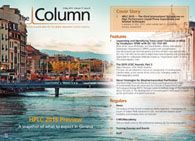HPLC 2015 — The 42nd International Symposium on High Performance Liquid Phase Separations and Related Techniques
HPLC 2015 - The 42nd International Symposium on High Performance Liquid Phase Separations and Related Techniques
Photo Credit: Katarina Stefanovic/Getty Images

Separation science, and liquid chromatography (LC) in particular, plays a key role in a number of fields including environmental science, food science, systems biology, medicine, bioanalysis, and quality control. Exciting new developments in hardware and fundamentals, miniaturization, multidimensional separations, sample preparation, and mass spectrometric (MS) detection have become key topics in the field. To cover all of these aspects, the conference will be organized around three main parallel sessions covering: 1) Core Separation Technology: Understanding the Fundamentals to Drive Innovation; 2) Hyphenated and Multidimensional Separations: Multidimensional LC, Mass Spectrometry, and Related Detection Methods; and 3) High Impact Sample Preparation Separation and Detection: On the Edge of Current and Future Applications. A fourth session will be dedicated to tutorials and short oral contributions (5 min) from selected posters.
Leading scientists from all over the world will present exciting and motivating plenary, keynotes, and tutorial lectures. Selected speakers include: Robert Kennedy (University of Michigan, USA); Peter Jenny (CERN, Geneva, Switzerland); Jack Henion (Ithaca, NY, USA); Ruedi Aebersold (ETHZ, Zürich, Switzerland); Mary J. Wirth (University of Purdue, USA); Peter Schoenmakers (University of Amsterdam, The Netherlands); Emily Hilder (University of Tasmania, Australia); Guowang Xu (University of Dalian, China); Luigi Mondello (University of Messina, Italy); and Thomas Hankemeier (University of Leiden, The Netherlands). A special session will be dedicated to the late Georges Guiochon to pay respect and honour his lifelong contributions to separation science.
Beside a strong scientific programme the conference will hold a large instrumentation, software, and consumables exhibition. Attendees will also have the opportunity to participate in lunchtime seminars to learn the latest developments from the exhibitors. Oneâday short courses will also be offered on Sunday 21 June 2015. A significant amount of time will be dedicated to the poster sessions where the participants can present their latest results and interact faceâto-face with scientists from all over the world.
The conference will also recognize the contributions of young scientists with the Csaba Horváth Award that honours the memory of Csaba Horváth and recognizes his contributions to HPLC. Travel awards are available from the conference organizers as well as from various supporting scientific organizations and young scientists are encouraged to apply. High level scientific contributions that will be awarded during the conference include: the Widmer-Simon Award, the Uwe D. Neue Award, and the ChromSoc Award.
An exciting social programme awaits the participants. Geneva is easily accessible from all major European cities and offers a wide range of accommodation for different budgets. HPLC 2015 in Geneva will offer a unique event to present the latest developments in fundamentals and applications in the separation sciences, stimulating scientific exchanges, synergies, and cooperation in a friendly environment.
Chair Person: Gérard Hopfgartner
E-mail: hplc2015@symporg.ch • Website: www.hplc2015-geneva.org
This article was published in LCGC's digital magazine, The Column. Click here to view the issue>

















Determining Neurotransmitters in Spinal Cords with UHPLC
February 18th 2025Researchers at Jilin University (Changchun, China) developed a highly sensitive, rapid, and accurate method for analyzing neurotransmitters (NTs) in rat spinal cord tissue. Ultra-high performance liquid chromatography-triple quadrupole tandem mass spectrometry (UHPLC-QqQ-MS/MS) in conjunction with ultra-ionic liquid dispersive liquid-liquid microextraction (UA-MIL-DLLME) were used to extract NTs for analysis.
The Next Frontier for Mass Spectrometry: Maximizing Ion Utilization
January 20th 2025In this podcast, Daniel DeBord, CTO of MOBILion Systems, describes a new high resolution mass spectrometry approach that promises to increase speed and sensitivity in omics applications. MOBILion recently introduced the PAMAF mode of operation, which stands for parallel accumulation with mobility aligned fragmentation. It substantially increases the fraction of ions used for mass spectrometry analysis by replacing the functionality of the quadrupole with high resolution ion mobility. Listen to learn more about this exciting new development.
Revolutionizing LC-MS with Next-Gen Separation for Cyclic Peptide Analysis
February 17th 2025Cyclic peptides, known for their stability and high specificity, are promising therapeutic agents in the fight against cancer, infections, and autoimmune diseases. However, developing effective cyclic peptides presents numerous challenges, including poor pharmacokinetics, efficacy, and toxicity. Traditional methods like liquid chromatography tandem-mass spectrometry (LC-MS/MS) often struggle with resolving isomeric linear peptide metabolites, posing significant risks in safety, efficacy, and regulatory approval. In this paper, Komal Kedia, PhD, will share how she leveraged MOBIE’s high-resolution ion mobility-mass spectrometry (IM-MS) system to achieve a 72% reduction in run times, 200% greater resolving power, and enhanced accuracy in identifying “soft spots” prone to enzymatic degradation.
Determining Neurotransmitters in Spinal Cords with UHPLC
February 18th 2025Researchers at Jilin University (Changchun, China) developed a highly sensitive, rapid, and accurate method for analyzing neurotransmitters (NTs) in rat spinal cord tissue. Ultra-high performance liquid chromatography-triple quadrupole tandem mass spectrometry (UHPLC-QqQ-MS/MS) in conjunction with ultra-ionic liquid dispersive liquid-liquid microextraction (UA-MIL-DLLME) were used to extract NTs for analysis.
The Next Frontier for Mass Spectrometry: Maximizing Ion Utilization
January 20th 2025In this podcast, Daniel DeBord, CTO of MOBILion Systems, describes a new high resolution mass spectrometry approach that promises to increase speed and sensitivity in omics applications. MOBILion recently introduced the PAMAF mode of operation, which stands for parallel accumulation with mobility aligned fragmentation. It substantially increases the fraction of ions used for mass spectrometry analysis by replacing the functionality of the quadrupole with high resolution ion mobility. Listen to learn more about this exciting new development.
Revolutionizing LC-MS with Next-Gen Separation for Cyclic Peptide Analysis
February 17th 2025Cyclic peptides, known for their stability and high specificity, are promising therapeutic agents in the fight against cancer, infections, and autoimmune diseases. However, developing effective cyclic peptides presents numerous challenges, including poor pharmacokinetics, efficacy, and toxicity. Traditional methods like liquid chromatography tandem-mass spectrometry (LC-MS/MS) often struggle with resolving isomeric linear peptide metabolites, posing significant risks in safety, efficacy, and regulatory approval. In this paper, Komal Kedia, PhD, will share how she leveraged MOBIE’s high-resolution ion mobility-mass spectrometry (IM-MS) system to achieve a 72% reduction in run times, 200% greater resolving power, and enhanced accuracy in identifying “soft spots” prone to enzymatic degradation.
